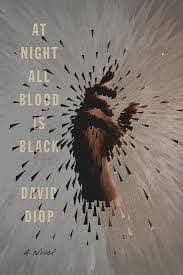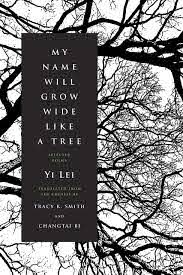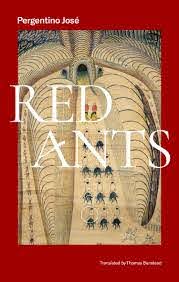There’s plenty to get excited about in the latest offerings from around the world, bound to satisfy the desires of any reader—from the emotionally visceral, to the patiently curious, to the surreal and the hallucinatory. In scoping for the finest translations, we bring you reviews of anti-colonialist fiction by a Prix Goncourt des Lycéens winner, a new collection from a leading figure of contemporary Chinese poetics, and the first ever literary translation from the Sierra Zapotec into English by a thrilling new voice.

At Night All Blood Is Black by David Diop, translated from the French by Anna Moschovakis, Farrar, Straus, and Giroux, 2020
Review by Lindsay Semel, Assistant Managing Editor
David Diop’s brutal sophomore novel, At Night All Blood Is Black, translated elegantly by Anna Moschovakis, is a relentless indictment of the colonial power structure. Through the utter dissolution of the protagonist, Alfa Ndiaye, the novel demonstrates its ripples and rhizomes throughout society—from the individual to the geopolitical to the environmental—rotting away what does not serve it. Though heavy and dark from beginning to end, this is a highly specific, deftly illustrated, poetically rendered critique that justifies the emotional slog.
Alfa is a chocolat soldier, a Senegalese man who has voluntarily travelled to fight on the side of France in the first World War. During the ensuing battles, Mademba, his childhood friend and “more-than-brother” is disemboweled before his eyes by an enemy soldier. We meet Alfa shortly after he has watched Mademba die slowly, refusing his pleas for mercy. In these scenes of articulate gore and moral anguish, Moschovakis reveals her poetic side in the restraint and somber vivacity with which she renders Diop’s descriptions. Alfa then finds himself in the throes of both deep regret and liberation from the moral conventions which had prevented him from acting in Mademba’s best interest. “No voice rises in my head to forbid me: my ancestors’ voices and my parents’ voices all extinguished themselves the minute I conceived of doing what, finally, I did.” The horror of both bearing witness to and being complicit in the suffering of a loved one silences the voices of morality in his head and marks his entrance into a world of alternate, competing guiding forces: his own tortured impulses and the abstract interests of the narcissistic state. He begins performing solo operations late at night in no-man’s land, disemboweling enemy soldiers and keeping one hand and a weapon from each kill.
A progression that functions on multiple planes expands the novel upwards and outwards from where it remains firmly rooted—in viscera spilled. As time advances and settings shift, Alfa’s psychological state, the narrative mode, the realms of reality, the overarching value system, and the gender coding of these spaces evolve in conjunction. Generally speaking, the trajectory is from the concrete to the abstract, the sober to the unhinged, the current to the eternal, the “real” to the mythological, the individual to the collective, and the masculine to the feminine. Alfa remains our guide, however unreliable, through this uncertain terrain, until his psychological coherence evaporates entirely, leaving the reader stewed in his reflections and testimonies.
A demon lurks in the trenches with Alfa and his fellow soldiers from the very beginning: “Yes, I told myself that I must be a dëmm, an eater of the insides of men. But I told myself, immediately after thinking it, that I couldn’t believe such a thing, that it wasn’t possible. At that time, it wasn’t really me who was thinking. I had left the door of my mind open to the thoughts of others, which I mistook for my own.” This rumor, circulating amongst the soldiers and based on Alfa’s macabre behavior, infiltrates Alfa’s self-conception. Yet the novel preserves the juxtaposition of demonhood with its more scientific brother: madness. By interlaying the real and the mythological planes of existence, the novel draws an elegant parallel between the processes of victimization and demonization. The mechanisms of war require spurts of temporary, controlled madness and demonic behavior from the soldiers; when this imposed schizophrenia causes a suffering in Alfa so unbearable that he loses the ability to control it, he is castigated by the same powers that made the original imposition. In this way, justification and fatalism are used to explain a condition both preventable and forced upon him. “Up to the third hand, I was a war hero, beginning with the fourth I became a dangerous madman, a bloodthirsty savage. God’s truth, that’s how things go, that’s how the world is: each thing is double.”
As the realm of myth gains prominence, storytelling itself makes its way to the forefront as a theme. From the beginning, the novel is peppered with conventions of oral storytelling. Repeated epithets, invocations, and phrases serve their traditional purposes of anchoring and orienting the reader in the universe of the text and highlighting crucial character traits. These features, within a (legitimate) reading of the novel as social-realist prose, tinge the narrative voice with mania and add a sonorous, hypnotic quality to the prose. When Alfa relates the story of a lion-sorcerer (with whom he identifies) who poses as a prince to kidnap a princess, “the fickle daughter of a vain king,” he destroys the barrier between the natural and supernatural worlds; he abandons himself irrevocably to the otherworldly while inviting the realm of story into “reality.”
She was in a place without a name, where the sand only looked like sand, where shrubs resembled shrubs, the sky, sky; a place where everything confused itself for everything else, a place where the ground too bore no scars, a place where the ground had no story . . . The lionsorcerer knew that if he lost the princess he would lose his only story, he would lose his meaning, he would lose even his name, that of lion-sorcerer. With the princess gone, his land became no-man’s-land again, for it was the princess who had enlivened it with her fancies. His land would never resuscitate itself unless the fickle princess returned to his cave-kingdom.
A scar is the precursor to a story. And so, the scars of the war—those inflicted on bodies, on minds, on the land—are the precursors to this story, and the two work together to reinforce reality. Mademba, by having been scarred, earns the right to be memorialized in narrative. Alfa, who has not (physically) incurred any scars, loses faith in his own reality. Under this paradigm, he aligns himself reluctantly with the colonial state, an abstraction that inflicts pain and reaps only benefits. Largely absent, it only casts a shadow over the story, which truly belongs to scarred people and scarred land.
We sympathize with Alfa despite his horrific actions. Despite his demonization by society, despite his self-negation, we suffer with him and we follow the logic of his demise. “Soon you will understand,” a voice in his head whispers to him, “that you were Mademba Diop’s blue-eyed enemy. You killed him with your words, you disemboweled him with your words, you devoured the insides of his body with your words.” He exhumes past offenses in order to seemingly take on a guilt that isn’t his. But being the good narrator that he is, he has laid his clues well, and we can easily follow them to the truth.

My Name Will Grow Wide Like a Tree by Yi Lei, translated from the Chinese by Tracy K. Smith and Changtai Bi, Graywolf Press, 2020
Review by Marina Dora Martino, Assistant Editor
That life is a series of unanswerable questions—Who am I? What is the meaning of being alive? Is there a God? What is love? Do I fear death?—is a truism, and much has been said about the value of asking questions against the anxiety of finding answers, like a scientific method applied to everyday life. Yet, we still live in an answer-hungry society which demands that we know who we are and what we want at all times. Yi Lei’s My Name Will Grow Wide Like a Tree, written over almost three decades, travels in the opposite direction. Yi was born in Tianjin, China in 1951. By the time she published her long poem, “A Single Woman’s Bedroom,” it was 1987, but the public was still shocked to learn there was a woman poet who remained unmarried, living with men and loving them freely, and who—childless—spoke unabashedly about desire and sex. This collection revolves around the questions that Yi Lei never shies away from asking, but makes a point of never settling with an answer.
I surrender my name
And all identity. I’m nobody.
Of consequence uncertain.
I go mute. I toe the dirt.
Life goes past quietly.
I’m boundless.
Refrains, repetitions, and reiterations of thought in Yi Lei’s poetry are evidence of an inquisitive mind, too impatient to rest on any one explanation or solution. In “Green Trees Greet the Rainstorm,” which opens the collection, her restlessness is already visible—two stanzas mirror one another and repeat each other’s words almost maniacally. The system of symmetry is so suffocating that the first stanza seems to close on the second like a sealing lid. In this uniformity, the poet inserts small variations which come across as irremediable disruptions. The first stanza starts out loud and clear:
I belong to the nation of wild arms flailing in wind.
Then, it doubts itself:
And I know you are bound to unravel me, but how can I not
Lift my head and look you in the eye?
In the second stanza, the sentences rearrange, then retrace their steps:
I belong to the nation of startling cries, voices flailing in wind.
And I know you are bound to unravel me, but how can I not
Lift my head and look you in the eye?
This is a strong opening gesture—there is doubt and play, and nothing is safe from them. Even the question of nationality, the most intimate question of belonging, is unrooted from the political plane and surreally reassembled on the personal level. Yi Lei refuses categorisation by moving in a private space and time, governed by her own rules, as if she had carved out a sensual world just for her inner life to imbue it to the point of total saturation. The poet is unapologetic about this bold choice; her self-obsession, and—why not—self-infatuation are structural to her independence and freedom. “My self-portrait hangs on the narrow wall, / And I kneel before it everyday,” she writes in the long sequence of “A Single Woman’s Bedroom.” But her portrait on the wall has a weight. In section ten of the same poem she writes:
I occupy the walls that surround me.
When did I become so rectilinear?
I had a rectilinear dream
These lines show that Yi Lei’s poetry is aware of her own weaknesses, obsessiveness, and self-loathing. They make her multiply and cover all the walls. By elegantly unloading them on the page in the same brushstroke as her independence and self-celebration, Yi builds a tone of voice that is delicate and passionate, but also sharply ironic and disillusioned. “Show me a road that doesn’t bear / Some trace of me.” she asks, exhausted by her own game. Her’s is a very particular kind of exhaustion—one that is mischievous, playful, and vulnerable. It reminds me of Anne Sexton and Sylvia Plath, poets who, like Yi Lei, were not unfamiliar with self-farm, self-doubt, and obsessive thoughts. Translator Tracy K. Smith wrote in the introduction to this collection that she asked Yi Lei permission to veer from the original, to seek the building of “a similar spirit or feeling for readers of American English.” Although I wish that some of the odder references to Chinese culture were kept instead of substituted by more familiar ones, I think the lingering presence of Sexton and Plath (in the syntax as much as in the music) are part of Smith’s choice to “make the reader feel at home” and open Yi Lei’s private world to the possibility of dialogue.
. . . swimming farther,
And farther into cold rhythmic waves, almost
Eager for the greedy underside of day.
God is ravenous unending fright.Blessed Virgin, safe on the shore, or high up
On the cliff overlooking every sea: forget me.
In this passage of “Love’s Dance,” the “greedy underside of day” maps out on the plane of the sea as underwater: the underwater of reality, in the poet’s choice to observe the world through the distorting filter of the waves, and of the water itself, giving voice to a thought that she’s afraid of but that she welcomes with a certain relief—the possibility of letting herself sink. The plea to the Blessed Virgin on the shore is simply “forget me.” There is a contrast—a productive on—between the attention that the poet pays to her inner life and the tendency to look for herself in the natural world. The private self in her poems is often flung distractedly into vaster landscapes for the sake of a comparison, or sometimes because nothing else matters more in the face of time than the elements—water, wind and rocks. Those are the ones that not only will outlive her, but, more importantly, have never been and will never be fixed.
My soul won’t plant itself in this deep black soil,
Recoils from eternity, like a thief. No,
My soul hangs with all that water, thousands of years’ worth
Roiling away
Up on the edge of that cliff

Red Ants by Pergentino José, translated from the Sierra Zapotec by Thomas Bunstead, Deep Vellum, 2020
Review by Samuel Miller, Chief Executive Assistant
In many ways, the term magical realism seems to be the literary equivalent of “here be dragons”—a catchall for an understanding of the universe and an experience with reality that North Americans and Europeans simply don’t have the cultural context for. I’ll admit that this collection of short stories was a challenge for me as someone who has always struggled with magical realism: not the genre itself, but the academic and critical discussions of it.
What I think magical realism requires, and what the stories in Red Ants encourage, is something far more mentally taxing than rationalization. It requires the reader to suspend disbelief, to take the author at his word and get utterly lost in a complex new world, held together by the poetic. This is not a book to approach with suspicion or attempts at interpretation; rather it requires a state of inquisitive wonder, and an acceptance that just because something doesn’t make sense, does not mean it isn’t real.
Magical realism represents a way of seeing the world in which the unexplainable and incomprehensible are embraced. Stone and moss and dirt and insects shape and fill the stories’ spaces, but even these physicalities are unreliable. Stone turns to dust and blows away; steam buries a man like earth. The very nature of things, like time, is questioned. The schizophrenic timeline and multitudinous existence of characters in some stories proved challenging to follow; in one, the narrator is searching desperately for a friend, but in the next sentence, the friend is speaking. Is this memory? Is this resolution? Is this the friend’s reality? In other instances, characters encounter duplicates of themselves, with seemingly no line or logic between the sacred and the mundane.
These stories are teeming with life and crawling with movement. They are, like magical realism itself, the articulation of a lived experience that is inexplicable without the fantastic. In the titular story, coffee pickers are like ants, trundling back and forth: “. . . the red ants go on working. So busy, nothing else registers with them.” A similar image is seen by the urban dweller looking through the sights of his rifle, aimed at the throng of early morning commuters in the story “Departure”: “I look at the clock on the wall. 7:09 a.m. People crowd along the sidewalk. So many lives out there, getting up, going out, hurrying down a street. A simple detail that, to me, seems magical.”
Thomas Bunstead’s translation is lyrical and poetic despite José’s short punchy sentences, and certain stories, like “Heart of Birds,” retain a King James biblical quality. The language is full of life, alliterations, patterns, rhythms.
The collection is held together by consistent themes and a nocturnal atmosphere. Most of the stories are dark and damp and claustrophobic; the images they conjure up are black and white, lit by moon or candle light, populated by silhouettes. A number of the stories take place in subterranean tunnels or foggy paths, but even in the ones featuring broad daylight there is a murkiness—as one character in “Heart of Birds” says, “I move forward as though inside a dark room, though the sun streams down still.”
Loss is one dominating theme. In many of these stories there is a search for someone missing: men waiting for women, women looking for children, kids whose parents have disappeared. Some seem to have been kidnapped, or are under the threat of it. In “Threads of Steam,” the protagonist is himself a professional kidnapper tragically contemplating the memory of his mother. These stories are inhabited by people who are lost in every sense of the word; sometimes, they don’t even seem real at all, at least not to the natural world. “The people here cast no shadows,” she says, “and their footsteps make no sound.” (“Red Ants”).
Another theme that appears in several of these stories is an unnamed sickness that, though it seems to be killing people in and around the characters’ communities, is talked about with a cool nonchalance. Despite this, and all the other occurrences of the uncanny, their realities do not faze the characters. As the stories unfold, it seems that these are not strange occurrences. They are normal, and the inhabitants’ responses are simply matter-of -fact.
There’s also a palpable sense of weariness in many of these characters—not resignation, mind you, they are still strong, still themselves, but worn and weathered. None of them have much in the way of physical characteristics (facial features go undescribed), but their words and conversations convey that they are hemmed in by their surroundings. Even their mental escapes are under siege. As a passage from “Room of Worms” describes:
You’re not free yet. You’re still a very fearful person, and those fears manifest in the people around you. All you can do is listen to that terrible sound of the machete and watch as they burn down the bamboo forest. They sense this when you approach, and they act accordingly. I know what you’re thinking. You heard the bridge of dreams breaking, somewhere.” She is quiet for a few moments. Then, in a steady voice, she says: “Nza nja mend tub do nit to? Can you hold back the sea? The bridge of dreams broke, but this world does not belong to you.”
About halfway through the collection, the stories shift in tone. There is more light, more fauna, and more urbanity. Violence and the imagery of blood begin to appear more regularly. The language shifts from recognizable dialogue, to biblical proclamations, to poetic narration, and back again.
I will fully admit that there were some stories in this collection that lost me completely, with language so prophetic that I, a heathen in this narrative world, simply couldn’t track. But isn’t that the real joy of reading translated literature? As the first literary translation into English from Sierra Zapotec, this effect is compounded. Not only are we, as English readers, getting a unique articulation of a lived experience from a world away, we are also sharing in the very first glimpse of how a language—unknown to the vast majority of us—builds and articulates a world inhabited by thousands of its speakers. It is moments like these when my reservations about elucidative readings and academic critiques feel most justified. With Red Ants, the best thing for the foreign reader to do is listen and take the author at his word.
Gabriel García Márquez, the godfather of magical realism, famously detested the moniker and the academics that were constantly reading all sorts of new meanings into his work, writing in El Pais in 1981 that “the interpretive mania eventually ends up being a new form of fiction that sometimes gets stranded on a foolish remark.” As if what he originally wrote wasn’t true to begin with, wasn’t sufficiently full of meaning, or wasn’t meant to be anything other than what it was.
Reading Red Ants is a visceral experience, at once exhausting and exhilarating, captivating and confounding. But I implore you, do not overanalyze this book. Check your suspicions and theories at the door. To open this book with those preconceptions would break the spell. Instead, look, listen, and feel the universe conjured by these stories—that’s where the real magic is.
******
Read more on the Asymptote blog:

